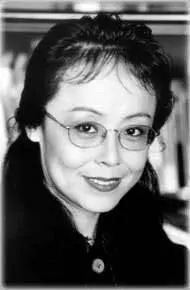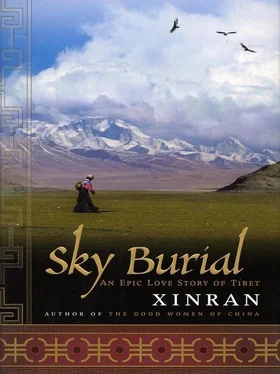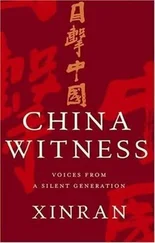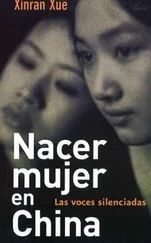When they arrived, she was stunned by the scene that greeted her.
Her sister’s courtyard home with its moon gates and the beautiful little garden by the river had disappeared, replaced by row upon row of high-rise buildings. She stood there, dazed, not knowing what to do or whom to ask for help. She approached some construction workers mending a road, but couldn’t understand a word any of them said. She finally worked out that they were from the south of Anhui Province and had no idea what had happened in Suzhou in the last three decades. Wen felt utterly lost.
As evening drew in, Wen gathered herself together and found a hotel not far from where her sister’s house used to be. A sign with two small stars on it hung above the reception desk, although Wen didn’t have a clue as to what that meant. At the desk, she was asked for her identity card but had no idea what that was. Instead, she produced the letter of introduction the Tibetan Military Department had given her. Unwilling to make a decision on her own about whether to let Wen register, the hotel receptionist asked her to wait a moment and disappeared. When she finally returned, she told Wen that she could have a room, but she should go and register at the police station as well.
THAT NIGHT, Wen dreamed she had returned to Tibet with Kejun to look for her parents and sister on the holy mountains. She was woken before daybreak by the roar of traffic. She sat watching it from her window until she fell into a daze. Her eyes were used to the endlessly rolling grasslands. Everything here seemed so crowded that she could make nothing of it. The hometown she had dreamed of had vanished without a trace.
At that moment, she heard the rattle of bamboo clappers below her window. Her heart leaped at the memories the sound awakened: when she was a little girl in Nanjing, the itinerant rice sellers carried such clappers and, when they passed her house, her mother would always buy her a little bowl of sweet fermented rice. Wen rushed out of her room, toward the sound. Outside she saw a familiar sight: a rice seller carrying two buckets suspended from a long pole on his shoulders. In one of the buckets the hot water used to cook the food steamed, heated by a small charcoal-burning stove built in beneath; from the other rose the old intoxicating aroma of fermented rice. Nothing had changed: even the waistcoat the man wore was the same as she remembered.
Wen hurried over to the peddler. He stopped banging his clappers.
“Eat here or take away?” he asked.
“Here,” she replied.
She watched him deftly pour a ladle of boiling water into a bowl, then scoop out two lumps of fermented rice with a bamboo spatula.
“Do you want egg?” he asked her. “A sprinkle of osmanthus flowers? How much sugar?”
“Everything, please, and one spoonful of sugar,” Wen replied. As he handed her the bowl, she burst into tears.
“Family problems?” the peddler asked her. “Don’t be sad. Just take life a day at a time, and the days will pass quickly enough.”
Drinking the sweet rice soup, now mixed with her tears, Wen struggled to compose herself.
“How long have you lived here?” she asked in a trembling voice.
“I came here ten years ago,” the peddler said. “I was no good for anything else so it was the bamboo clappers for me. But it’s not bad work and every day there’s something new. Even the road I walk down is different every year.”
Wen asked him if he knew her sister and her parents and described to him the house they used to live in. The peddler gave it some thought.
“I’m afraid not,” he said. “In the ten years I’ve lived here, this area has been knocked down and rebuilt three times. The first time was during the ‘Three Constructions,’ or whatever it was. Then they built a road and a bridge, only to pull them down again. After that they sold a big chunk of land to Singapore. Many people have come and gone around here. These days you hear fewer and fewer local accents.”
He went back to banging his clappers.
Wen stood in the middle of the street, paralyzed by the strangeness of her hometown. She was so absorbed in thought that she heard neither the sound of the clappers nor the noise of the cars and bicycles rushing past her only inches away. All she had now were her memories. Would she have the courage to embark on a second search so late in her life? If not, where should she go?
She put her hand into the pocket of her robe where she kept the photograph of Kejun. Laying her fingers on the image that had shared the sweetness, the bitterness, and the sweeping changes of her life for so many years, she whispered, “ Om mani padme hum.”
Up above, a family of geese flew toward home.
Here, there were neither sacred vultures nor sky burials.

Most respected Shu Wen,
Where are you?
For ten years this book has been in my heart, maturing like wine. Now, at last, I can present it to you.
I hope that, sometime, you will be able to hear the gasps of admiration that the beauty of your story inspires.
I hope that, sometime, you will be able to answer the countless questions that I have for you. At the very least, I would like to know what has become of Zhuoma and Tiananmen, of Saierbao and her family.
I have spent many years searching for you, hoping that we might sit together again in the tea-scented Yangtze delta so that you can tell me the story of your life after Sky Burial.
Dear Shu Wen, if you see this book and this letter, I earnestly beg you to contact me through my publisher as soon as possible.
Xinran
London, 2004
Sky Burial is the result of years spent learning how to understand and feel Shu Wen’s love, the spiritual life of Tibetans, and how different culture, time, life, and death can be for different people.
I don’t know how to thank the following people enough: Julia Lovell (who carried a “football player” in her body) and Esther Tyldesley, whose translation allowed Sky Burial to be read in English; my editor at Chatto & Windus for helping this book find its readers; Mr. Hao-chong Liu, who spent months helping me with my research and fact-checking in China; Toby Eady, my “bossy” husband with his professional mind and lover’s heart; and Random House, booksellers, and you.
I cannot say thanks enough to you who have taken the time to read my books with your interest in and love of China and Chinese women. I have received responses to The Good Women of China from all over the world, so full of open hearts and personal memories that I should now have a book called The Good Women of the World.
No one likes crying, but tears water our souls. So perhaps my thanks should be to allow you to cry for the Chinese women in my books…

Xinran was born in Beijing in 1958 and was a successful journalist and radio presenter in China. In 1997 she moved to London, where she began work on her seminal book about Chinese women’s lives, The Good Women of China, which became an international bestseller. Sky Burial is her second book.
***
















